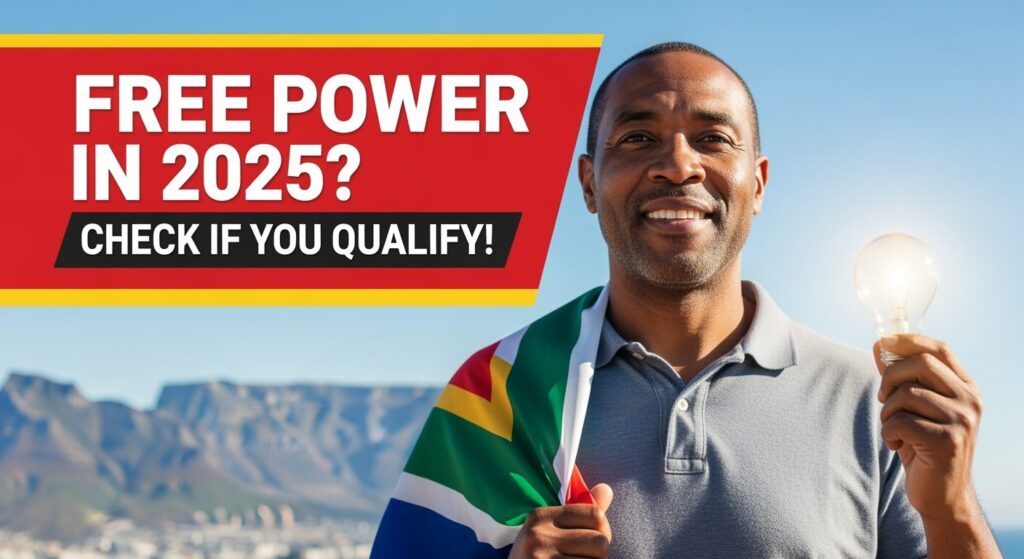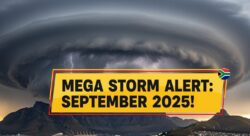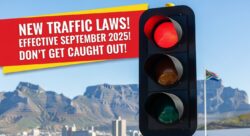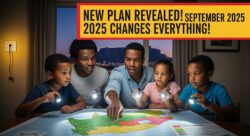Free Basic Electricity South Africa: As we approach 2025, thousands of South African households are set to qualify for the Free Basic Electricity (FBE) program, a vital government initiative designed to provide essential electricity access to vulnerable communities. I’ve been researching this program extensively, and the good news is that more citizens than ever before may be eligible for this crucial support. If you’re struggling with rising energy costs, this program could provide much-needed relief for your household. But how do you know if your name is included in the thousands who qualify for free basic electricity in 2025 South Africa? Let’s explore the details of this program and help you determine your eligibility.

What Is the Free Basic Electricity Program?
The Free Basic Electricity program is a government initiative that provides a specified amount of free electricity to qualifying low-income households. This program aims to ensure that even the most economically vulnerable South Africans have access to a basic level of electricity for essential needs. Typically, the program offers between 50-100 kWh of free electricity monthly, depending on your municipality’s specific implementation. This allocation is designed to cover basic lighting, basic media access, basic water heating using a kettle, and basic ironing and cooking for a modest household.
The program is part of South Africa’s broader social welfare system, recognizing electricity as a basic necessity rather than a luxury. As we look toward 2025, the government has indicated plans to expand the program to reach more households, particularly in underserved rural areas and informal settlements. Could your household be among the thousands who qualify for free basic electricity in 2025 South Africa? The answer depends on several specific criteria.
How to Check Your Eligibility
Determining if you qualify for free basic electricity requires understanding the eligibility criteria. The primary qualification is based on household income, with the program targeting those classified as indigent. Generally, households with a total monthly income below a certain threshold (typically around R3,500, though this varies by municipality) are considered eligible. Additionally, you must be a legal resident of South Africa and have a formal electricity connection with a valid meter number.
To check if your name is included, you’ll need to visit your local municipal office or contact your electricity provider. Many municipalities now offer online verification systems where you can enter your ID number and address to check your status. Some areas also implement automatic registration based on electricity consumption patterns, identifying households that consistently use minimal electricity as potentially indigent.
Why the Program Is Expanding in 2025
The planned expansion of the Free Basic Electricity program for 2025 comes in response to several critical factors affecting South Africa. First, the ongoing economic challenges exacerbated by global events have pushed more households into financial vulnerability. Second, the government has recognized that energy poverty directly impacts other development goals, including education, health, and economic participation. When families can’t afford electricity, children can’t study after dark, food preservation becomes difficult, and income-generating activities may be limited.
Additionally, the expansion aligns with South Africa’s commitment to the United Nations Sustainable Development Goals, particularly Goal 7, which focuses on ensuring access to affordable, reliable, sustainable, and modern energy for all. By increasing the number of beneficiaries, the government aims to reduce inequality and promote social inclusion. The 2025 expansion is expected to include more granular income assessment methods to better identify truly needy households.
When and How to Apply
If you believe you qualify for free basic electricity but aren’t currently receiving it, you should apply as soon as possible rather than waiting until 2025. The application process typically involves registering as an indigent household with your local municipality. You’ll need to provide proof of residence, identity documents for all household members, bank statements or affidavits confirming your income status, and your electricity meter number.
Most municipalities conduct annual reviews of indigent registries, so even if you’re already registered, it’s important to re-apply or confirm your status periodically. Some municipalities have implemented rolling registration periods throughout the year, while others have specific application windows. I recommend contacting your local municipal office to determine the exact application timeline relevant to your area.
- Gather all required documentation (ID, proof of residence, income verification)
- Visit your local municipal office or check if online application is available
- Complete the indigent household registration form
- Submit your application and keep the reference number
Real-Life Impact: The Dlamini Family
The Dlamini family from Soweto represents just one example of how the Free Basic Electricity program changes lives. As a household of five surviving on a single pension, they struggled to afford basic electricity needs. After qualifying for the program, they received 50 kWh of free electricity monthly, which allowed them to keep lights on in the evening for the children to study. Mrs. Dlamini reported that their academic performance improved significantly, and the family could redirect the money previously spent on basic electricity toward better nutrition and school supplies.
The Free Basic Electricity 2025 South Africa program represents a significant step toward energy equity in the country. As the program expands, more households will have access to this essential service. I encourage you to check your eligibility and apply if you meet the criteria. Remember, electricity isn’t just about convenience—it’s a fundamental component of modern life that affects education, health, and economic opportunity. Don’t miss out on this vital support if your name could be included among the thousands who qualify.





